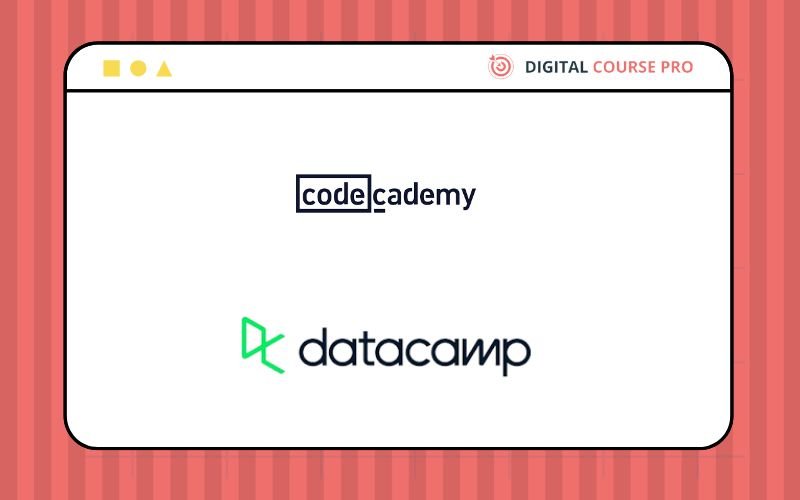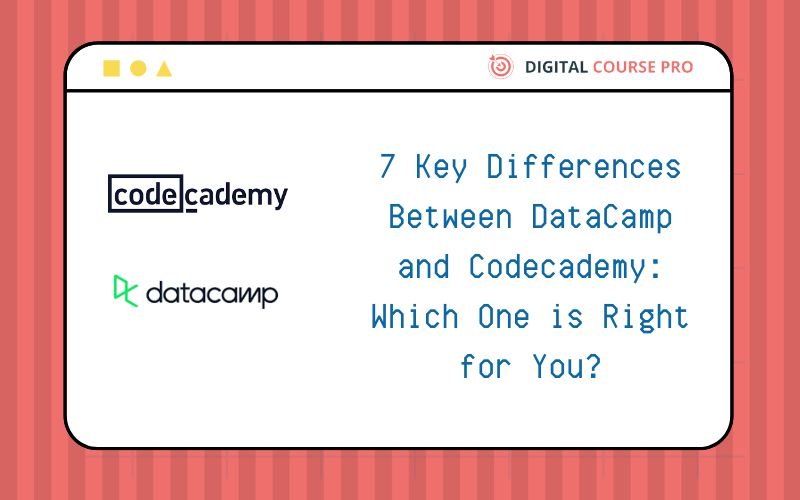When deciding between DataCamp vs Codecademy, understanding their differences is crucial to making the best choice for your learning goals. Both platforms offer a wealth of coding and data science courses, but they cater to different audiences and learning styles. Here’s a detailed comparison to help you decide which one suits you best.

1. Course Offerings
DataCamp: Primarily focuses on data science, offering courses in Python, R, SQL, and other data-centric tools and technologies. It’s an excellent choice for those specifically interested in data analysis, machine learning, and data visualization.
Codecademy: Offers a broader range of programming languages and technologies, including web development (HTML, CSS, JavaScript), mobile development, and computer science fundamentals. If you want a more general coding education, Codecademy might be the better option.
2. Learning Approach
DataCamp
DataCamp employs a hands-on, interactive approach that is specifically designed for learning data science. The platform integrates coding exercises directly into the learning environment, allowing users to practice new concepts immediately. This practical, learn-by-doing methodology is particularly effective for mastering data science skills, as it enables learners to apply theoretical knowledge to real-world scenarios without needing to set up their own coding environments.
Each course in DataCamp consists of short video lessons followed by interactive exercises that reinforce the material covered. These exercises often involve real datasets, which helps learners gain experience working with data they might encounter in professional settings. Additionally, DataCamp offers guided projects that are structured to simulate actual data science tasks, providing users with the opportunity to build a portfolio of work that can demonstrate their skills to potential employers.
Moreover, DataCamp includes detailed feedback and hints within its exercises, helping learners understand their mistakes and learn from them. This continuous feedback loop is essential for mastering complex topics, making DataCamp a robust platform for those who prefer an immersive, practice-oriented learning experience.
Codecademy
Codecademy also adopts an interactive learning approach, but it encompasses a wider range of programming disciplines beyond data science. The platform combines text-based tutorials, interactive coding exercises, quizzes, and projects to create a diverse and engaging learning experience.
One of Codecademy’s standout features is its use of projects that are integrated into the learning paths. These projects are designed to simulate real-world applications, such as building a website, creating a mobile app, or developing a game. This project-based learning helps learners see the practical applications of their coding skills and allows them to build a portfolio that showcases their versatility.
In addition to the projects, Codecademy offers numerous quizzes and checkpoints throughout its courses to ensure that learners have grasped the fundamental concepts before moving on to more advanced topics. This structured progression helps learners build a solid foundation of knowledge, which is essential for tackling more complex programming challenges.
Furthermore, Codecademy’s learning paths are tailored to different career goals, such as becoming a web developer, data scientist, or computer scientist. These paths provide a curated sequence of courses and projects, guiding learners through the skills and knowledge necessary to achieve their specific career objectives.
DataCamp vs Codecademy
When comparing DataCampvs Codecademy in terms of learning approach, it’s clear that both platforms offer interactive, hands-on learning experiences but cater to different needs and preferences. DataCamp’s approach is highly specialized, focusing on data science and providing extensive practice with real datasets and guided projects. This makes it an ideal choice for those who are specifically interested in data science careers and want to gain practical, job-ready skills.
On the other hand, Codecademy’s approach is broader, covering a wide array of programming languages and disciplines. This diversity allows learners to explore different areas of programming and build a versatile skill set. Codecademy’s integration of real-world projects and career-focused learning paths makes it suitable for those who seek a comprehensive coding education that spans multiple fields.
In conclusion, the choice between DataCampvs Codecademy should be guided by your career goals and preferred learning style. If you aim to specialize in data science and prefer a focused, practice-driven approach, DataCamp is the platform for you. Conversely, if you want a broader programming education with the flexibility to explore various tech disciplines, Codecademy offers the diverse learning experience you need.
3. Project-Based Learning
DataCamp
DataCamp places a significant emphasis on project-based learning, particularly within the context of data science. The platform offers a variety of guided projects that allow learners to apply their skills to real-world data problems. These projects are designed to simulate the types of challenges that data scientists encounter in professional settings, providing practical experience that goes beyond theoretical knowledge.
DataCamp’s guided projects are typically centered around real datasets from various industries, such as finance, healthcare, and marketing. By working on these projects, learners can develop a portfolio that showcases their ability to analyze data, build predictive models, and visualize results. This hands-on experience is invaluable for those seeking to demonstrate their proficiency to potential employers.
Furthermore, DataCamp’s projects come with step-by-step instructions and support, making them accessible even to beginners. Each project includes detailed feedback and explanations, helping learners understand their mistakes and improve their skills. This structured, supportive approach ensures that learners can successfully complete projects and build confidence in their abilities.
Codecademy
Codecademy also strongly emphasizes project-based learning but covers a broader range of programming disciplines. The platform integrates projects into its courses and career paths, allowing learners to apply what they’ve learned in a practical, hands-on manner. These projects are designed to reflect real-world applications, helping learners build a diverse portfolio that demonstrates their coding skills across different domains.
For instance, Codecademy offers projects related to web development, such as building interactive websites using HTML, CSS, and JavaScript. Learners can also work on projects in other areas, like mobile app development, game development, and data science. This variety allows learners to explore different fields and decide which areas they are most passionate about.
In addition to individual projects, Codecademy includes capstone projects in its career paths. These capstone projects are more comprehensive and often require integrating skills from multiple courses. They are designed to simulate real-world job tasks and provide a significant portfolio piece that learners can showcase to potential employers.
Codecademy’s projects are accompanied by detailed instructions and checkpoints, ensuring that learners can follow along and complete the projects successfully. The platform also provides forums and community support, where learners can ask questions and get help from peers and instructors.
DataCamp vs Codecademy
When comparing DataCamp vs Codecademy in terms of project-based learning, both platforms offer valuable hands-on experiences but with different focuses and methodologies.
DataCamp is ideal for those who want to specialize in data science. Its guided projects are specifically designed to teach practical data analysis, machine learning, and data visualization skills using real datasets. The structured, supportive nature of these projects helps learners build a robust portfolio that is directly relevant to data science careers.
Codecademy, on the other hand, provides a broader range of project-based learning opportunities across various programming disciplines. Its projects cover web development, mobile app development, game development, and more, making it suitable for learners who want to explore multiple areas of programming. Codecademy’s capstone projects offer a comprehensive, real-world experience that can help learners build a versatile portfolio showcasing their diverse coding skills.
In conclusion, the choice between DataCamp vs Codecademy for project-based learning depends on your career goals and interests. If you are focused on a career in data science and want to develop practical, job-ready skills through real-world projects, DataCamp is the better choice. However, if you seek a more diverse coding education with the opportunity to work on projects across different programming fields, Codecademy’s broad range of project-based learning options will better suit your needs.
4. Pricing Structure
When evaluating DataCamp vs Codecademy, understanding the pricing structure is essential as it directly impacts your investment in learning. Both platforms offer a range of subscription options, but they cater to different needs and budgets.
DataCamp
DataCamp provides a tiered subscription model designed to accommodate various learning needs and financial capacities. The platform offers three main plans: Basic, Premium, and Teams.
- Basic Plan:
- Free access but limited in scope.
- Includes a few selected courses, allowing users to get a taste of the platform without any financial commitment.
- Suitable for those who are just starting out and want to explore data science before investing.
- Premium Plan:
- Priced at approximately $25 per month when billed annually.
- Grants full access to over 350 courses, skill tracks, and career tracks.
- Includes all features such as interactive coding exercises, projects, and unlimited access to the entire course library.
- Ideal for individuals committed to advancing their data science skills and seeking comprehensive learning resources.
- Teams Plan:
- Designed for businesses and educational institutions.
- Offers bulk pricing and additional administrative features.
- Facilitates group learning and progress tracking, making it suitable for organizations looking to upskill their employees or students.
DataCamp’s pricing structure is straightforward, focusing on providing value through extensive course offerings and practical projects. The Premium plan, in particular, offers substantial resources for those serious about pursuing a career in data science.
Codecademy
Codecademy also operates on a subscription model with a free tier and a Pro membership. The platform is designed to cater to both casual learners and those seeking an in-depth, structured learning experience.
- Free Tier:
- Offers access to basic courses and introductory content.
- Allows learners to explore various programming languages and get a feel for the platform without any cost.
- Good for beginners who want to learn the basics of coding before committing to a paid plan.
- Pro Membership:
- Priced at around $39.99 per month or $240 per year.
- Provides access to all courses, career paths, skill paths, and projects.
- Includes additional features such as quizzes, real-world projects, and personalized learning plans.
- Pro members also benefit from exclusive content like career advice and interview preparation resources.
- Teams Plan:
- Tailored for businesses and educational institutions.
- Offers bulk pricing, administrative tools, and progress tracking for teams.
- Suitable for organizations aiming to provide structured coding education and skill development for their members.
Codecademy’s pricing structure is slightly more expensive on a monthly basis compared to DataCamp, but it offers a wider range of content across different programming disciplines. The Pro membership is particularly valuable for learners who want a comprehensive, all-inclusive coding education.
DataCamp vs Codecademy
When comparing DataCamp vs Codecademy in terms of pricing structure, several key differences emerge:
- Focus and Value:
- DataCamp’s pricing is geared towards those specifically interested in data science. Its Premium plan offers extensive resources for a relatively affordable annual fee, making it a cost-effective option for aspiring data scientists.
- Codecademy’s pricing reflects its broader range of course offerings. Although slightly more expensive, the Pro membership provides access to a diverse set of programming courses, projects, and career paths, catering to a wider audience.
- Free Access:
- Both platforms offer free tiers, but DataCamp’s free plan is more limited, giving only a glimpse of its full offerings. Codecademy’s free tier, however, provides a more substantial introduction to various coding languages and basics, making it more appealing for beginners.
- Additional Features:
- DataCamp’s Premium plan includes interactive coding exercises and projects specific to data science, while Codecademy’s Pro membership offers a broader range of projects, quizzes, and personalized learning plans across multiple programming domains.
- Business and Educational Plans:
- Both platforms offer plans for teams, but the pricing and features may vary based on the number of users and specific organizational needs. These plans provide valuable resources for group learning and skill development within companies and educational institutions.
In summary, when considering DataCamp vs Codecademy for pricing structure, it’s important to align your choice with your learning goals and budget. DataCamp’s pricing is ideal for those focused on data science, offering great value for its specialized content. Conversely, Codecademy’s broader range of courses and slightly higher cost make it suitable for learners seeking a comprehensive coding education across various disciplines. Both platforms offer flexible plans to accommodate individual learners and organizations, ensuring there is an option to fit different needs and financial situations.
5. Career Services
DataCamp: Provides career services like resume reviews and access to a job board for data-related roles. Their career tracks are tailored to specific data science job roles, providing a clear path from learning to employment.
Codecademy: Offers career paths that include job preparation resources such as interview practice and career advice. Their career services are broader, covering various programming and development roles.
6. Community and Support
DataCamp: Has a supportive community forum and offers personalized feedback on exercises and projects. Their support is geared towards helping learners overcome specific data science challenges.
Codecademy: Features a vibrant community forum and live events, such as coding bootcamps and webinars. The broader focus of Codecademy’s community can be beneficial for networking across different tech fields.
7. Certification and Recognition
DataCamp: Awards certificates upon course and track completion, which can be added to LinkedIn profiles. These certificates are well-recognized in the data science community.
Codecademy: Also provides certificates of completion, which can be shared on professional networks. Codecademy’s certificates cover a wider range of subjects, which can be advantageous for general programming roles.
Conclusion
Choosing between DataCamp and Codecademy hinges on your specific learning goals, career aspirations, and preferred learning style. Here’s a comprehensive breakdown to help you decide:
Focus Areas
If you’re primarily interested in data science, DataCamp’s specialized offerings in Python, R, SQL, and other data-centric tools are designed to provide you with a deep understanding and practical skills in these areas. DataCamp’s hands-on, interactive approach ensures that you not only learn the theory but also apply it immediately, which is crucial for mastering data science concepts. The platform’s emphasis on guided projects allows you to tackle real-world data problems, which is invaluable for building a strong portfolio tailored to data science roles.
On the other hand, Codecademy’s extensive range of programming languages and technologies caters to learners looking for a more generalized coding education. Whether you are interested in web development, mobile development, or computer science fundamentals, Codecademy provides a broad foundation that can open doors to various tech careers. The platform’s mix of text-based tutorials, interactive coding exercises, and comprehensive projects helps you build a versatile skill set. Codecademy’s projects often simulate real-world applications, enabling you to develop a robust portfolio that demonstrates your ability to apply coding skills across different scenarios.
Career Support
DataCamp offers career tracks specifically designed for data science roles, complete with resume reviews and access to a job board tailored to data-related positions. This focused career support can be instrumental in transitioning from learning to employment in the data science field. The platform’s certificates of completion are well-recognized within the data science community, enhancing your professional credibility.
In contrast, Codecademy provides career paths that encompass a broader spectrum of programming and development roles. Their career services include job preparation resources, such as interview practice and career advice, which are beneficial for navigating the job market in various tech fields. Codecademy’s vibrant community forum and live events, such as coding bootcamps and webinars, offer additional opportunities for networking and professional growth.
Pricing and Accessibility
Both platforms follow a subscription model, but there are differences in their pricing structures and what they offer. DataCamp’s Basic plan is free but limited, while the Premium plan grants full access to all courses and projects. Codecademy also offers a free tier, but their Pro membership unlocks access to all courses, projects, and career paths. For those contemplating an investment in their learning, exploring the benefits of Codecademy Pro is worthwhile. You can find a detailed analysis of Codecademy Pro’s value at Digital Course Pro, which provides insights into whether the enhanced features and resources justify the subscription cost.
Making Your Decision
Ultimately, the decision between DataCamp vs Codecademy should be based on your specific needs and career goals. If you are aiming for a career in data science, DataCamp’s specialized courses and practical projects offer a clear and effective path to achieving your goals. However, if you are looking for a more versatile coding education that spans multiple programming disciplines, Codecademy’s comprehensive curriculum and diverse project offerings provide a broader foundation.
Consider your learning preferences, the skills you wish to acquire, and the type of career support you need. Both platforms offer unique advantages, so choose the one that aligns best with your aspirations. Whether you decide to dive deep into data science with DataCamp or pursue a wide-ranging coding education with Codecademy, both platforms can help you build the skills necessary to succeed in the tech industry.





